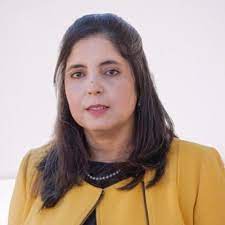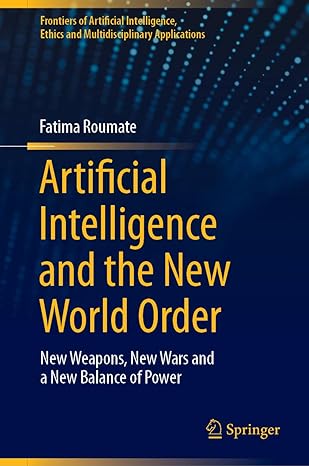Professor Fatima Roumate, in her just-published book “Artificial Intelligence and the New World Order: New Weapons, New Wars and New Balance of Power”, Springer, examines the application of AI in the context of the changing balance of power in international relations, assuming that AI is changing several notions related to states, as it is reshaping international relations and the role of different actors in international society, where powerful actors are emerging and influencing international relations more than before, such as transnational corporations.

Professor Fatima Roumate is among the leading experts on artificial intelligence (AI) internationally. Her book ,“AI, Higher Education and Scientific Research: Future Developments“ is in Springer’s top 100 education bestsellers Winter 2023/2024 , while her book “Artificial Intelligence and Digital Diplomacy” is in BookAuthority top 100 bestselling diplomacy books of all time.
As Oleg P. Ivanov, deputy head of the Department of International and National Security of the Diplomatic Academy of the Ministry of Foreign Affairs of the Russian Federation, points out in his preface to the book, “The future of the world largely depends on how AI will be employed by humanity, whether for beneficial or malicious purposes. Professor Roumate’s book represents an important contribution to understanding and positively addressing this phenomenon”.
Significantly, a new theory of international relations called AI Theory is introduced in the book, based on the mixture of realism and liberalism with technological approaches.
Professor Roumate’s theory is founded on the following assertions:
– AI is more realistic than political decisions.
– AI is able to analyze big data and make decisions faster than humans (diplomats and politicians).
– AI could help create a balance of power.
– AI could facilitate the achievement of national interests without the use of hard power or military warfare. meaning that AI could secure the national interest when used for cyber or psychological warfare.
– AI could be used in any kind of power (hard, soft and smart power) to achieve national interest. national interest.
– AI could predict the future and help develop prospective strategies based on well-defined goals.
– Considering the neurological impact of AI, these advanced technologies could also guide emotions and public opinion toward the national interest.
The book explores the points of connection between these emerging theories and various theories of international relations, particularly realism, from the scientific work of Thucydides to contemporary leaders of the new realism and liberalism.
It also examines the impact of individuals, who are the main source of big data, often referred to as the oil of AI. Technological approaches are also used in the analysis of several topics included in this book, particularly these new power spaces.
The book’s methodology is based on a multidisciplinary approach. First, a policy approach to measuring the impact of AI on international relations. Second, a doctrinal approach, with a review of existing laws, regulations, and scholarly literature in the field of AI and its challenges related to international law and international humanitarian law.international humanitarian law. Third, a prospective approach to analyze the challenges related to AI trends. Fourth, a technological approach to consider the interaction between AI and international relations.
Through study and analysis, the author explores the evolution of a range of concepts related to sovereignty, diplomacy, security, and power, with the emergence of new transnational spheres of power, and in thirteen chapters she addresses a wide range of epistemological themes and issues.
Chapter 1 defines the key concepts used in the volume, with the aim of clarifying the ambiguities between some of the concepts, considering the points of connection and diversity among them.
Chapter 2 describes how Artificial Intelligence is affecting international relations and highlights the post-COVID-19 international society and how Artificial Intelligence is affecting international relations and the post-COVID-19 international society, where the new balance of power is based on intelligent power and new types of warfare. The challenges posed by all these changes are also highlighted.
Chapter 3 focuses on the new weapons that are now being used in new forms of warfare with new actors, especially with the decline and fall of the global leadership of the United States and the emergence of new powerful actors. of the United States and the emergence of new powerful actors.
Chapter 4 addresses the current evolution of certain notions and principles such as the sovereignty recognized since the Westphalian system established in 1648 to the states and which are now being challenged by “big technologies.”
Chapter 5 is devoted to foreign policy and diplomacy in the age of AI. In the age of AI. What tools, functions and missions should diplomats have in this new era? this new era? How is AI affecting diplomacy? The chapter emphasizes the importance of rethinking foreign policy strategies in light of emerging technologies.
Chapter 6 discusses the malicious use of AI and its implications for international psychological security. international psychological security.
Chapter 7 discusses the malicious use of AI and its implications for diplomacy and international psychological security, and offers arguments on the main challenges related to digital diplomacy.
Chapter 8 discusses mechanisms related to international psychological security in the age of AI.
Chapter 9 presents an initial discussion of scenarios related to terrorism and lethal autonomous robotic systems (LARS).
Chapter 10 discusses a new type of psychological warfare that combines the power of advanced technologies with the power of knowledge and information.
Chapter 11 is devoted to understanding how the United States is using social media and artificial intelligence as a new tool for psychological operations in Latin America, with a focus on the case of Venezuela.
Chapters 12 and 13 focus on the impact of AI in the international economic order, also with reference to the changes in the trade of products and services and decline of the exclusive dominance of the U.S. dollar.
 In essence, “Artificial Intelligence and the New World Order: New Weapons, New Wars and New Balance of Power! is a must-read book, very useful in advancing knowledge and drawing the attention of experts, policymakers and the public to this important issue.
In essence, “Artificial Intelligence and the New World Order: New Weapons, New Wars and New Balance of Power! is a must-read book, very useful in advancing knowledge and drawing the attention of experts, policymakers and the public to this important issue.
On May 10, the author’s presentation of the book was included in the program of activities hosted by the General Secretariat of the Government of Morocco at the 29th International Book Fair in Rabat, reflecting the book’s important contribution to the strategic and technological surveillance policy adopted by the General Secretariat.
The book has received many endorsements from the academic and international community. We mention a few:
– “Artificial Intelligence has appeared in the context of the great information technology revolution as the culmination of decades of study and endeavor of the human mind, and its effects are developing on multiple levels – from education to justice, from politics to the governance of human communities, from the configuration of social relations to the establishment of geopolitical hierarchy, etc. In this context, Professor Roumate’s work becomes necessary because it analyzes some very important issues, such as the transformations that will appear in politics, mass media and general relations between states. Aspects related to the use of Artificial Intelligence in both an ethical and malicious sense are examined, in order to better understand the new framework in which geopolitical relations between states will be formulated in the coming decades. I commend Professor Roumate’s work as necessary in this period of geopolitical readjustment, knowing her remarkable qualities as a researcher and her analytical subtlety”. Marius Vacarelu, PhD – National School of Political and Administrative Studies, Bucharest, Romania
– “This book is a perfect example of political reflection focused on AI-related challenges and opportunities. Using political philosophy as a lens, the book presents a new theory of international relations based on the idea that AI can predict the future and help outline better strategies based on well-defined goals. The author offers a compelling conceptual framework that provides guidelines for policymakers and practitioners to address the risks of the new technological era.” Sergei A. Samoilenko, George Mason University
– “Professor Fatima Roumate has covered, in the pages of this extremely timely book, two critical issues that are shaping international relations in the 21st century, influencing the shape of what will happen in the near future: the evolving global geopolitical landscape and the rise of artificial intelligence. The book addresses a number of critical contemporary issues concerning various threats and opportunities for the emerging new global order. It is a must-read for anyone interested in understanding the key variables that are shaping the future of international relations!” Greg Simons, associate professor at Turiba University (Latvia) and Uppsala University (Sweden)
– “In today’s context, Professor Fatima Roumate’s book, AI and International Relations: A New Balance of Power in a New World Order, is an important and welcome addition to this field, which has been poorly addressed by researchers. The significant aspect of this book is that it seeks to examine the more complex issue of AI and international relations from the emerging new multipolar world order. The author highlighted how the pandemic has affected international relations by changing power relations in different spheres, where AI has occupied a central position in this restructuring. The author highlighted the need to examine the challenges of AI in restructuring different institutional spheres, both nationally and internationally. This book will be a must-read for researchers, policy makers, students of international relations, and many others working in the area of AI and ethics”. Prof. Siva Prasad Rambhatla – Former Honorary Professor (CDLTR) and Professor of Anthropology, University of Hyderabad, India.
“Dr. Fatima Roumate is particularly qualified to write about artificial intelligence (AI) and in her book she offers a remarkable analysis of the key issues related to the impact of AI in international relations. The book is impressive and should be required reading for anyone who is excited about the potential of AI, but also concerned about its possible harmful use and the challenges it poses to diplomacy.” Marcello Iannarelli, editor of World Geostrategic Insights
– “Fatima Roumate is an excellent practitioner strongly dedicated to the topic of ethics of artificial intelligence. For many years I have witnessed her daily dedication and commitment in publications, presentations in many international academic activities, and organization of international conferences and seminars. Of course, she has left an important legacy in articles and books on AI. She gave me a real motivation to start my journey in the very important topic of AI. I am sure that, based on your extensive professional experience and personal qualities, your new book on the ethics of artificial intelligence will be a great work, an up-to-date approach to the contemporary reality, future and challenges of AI from an ethical perspective”. Amaro La Rosa, UNIFE professor, Lima, Peru.
……………………………………………
Fatima Roumate is President of IIRS, International Institute for Scientific Research, and Founding President of the Global Network on AI and International Society GNAI&IS. She is member of the UNESCO Ad Hoc Expert Group on the Ethics of Artificial Intelligence and Full Professor of International Law at Mohammed V Agdal University in Rabat, Morocco. She received the Award titled “Iconic Leaders Creating a Better World for All” at the Women Economic Forum 2017. She is a member of several scientific board committees of indexed journals and she published several books and indexed articles in Arabic, French, and English.
Related Post
World Geostrategic Insights interviews Fatima Roumate on how the increasing use of artificial intelligence (AI) weapons on the battlefield may overthrow the current fundamentals of warfare, paving the way for future conflicts, how AI arms are fostering a new international balance…







